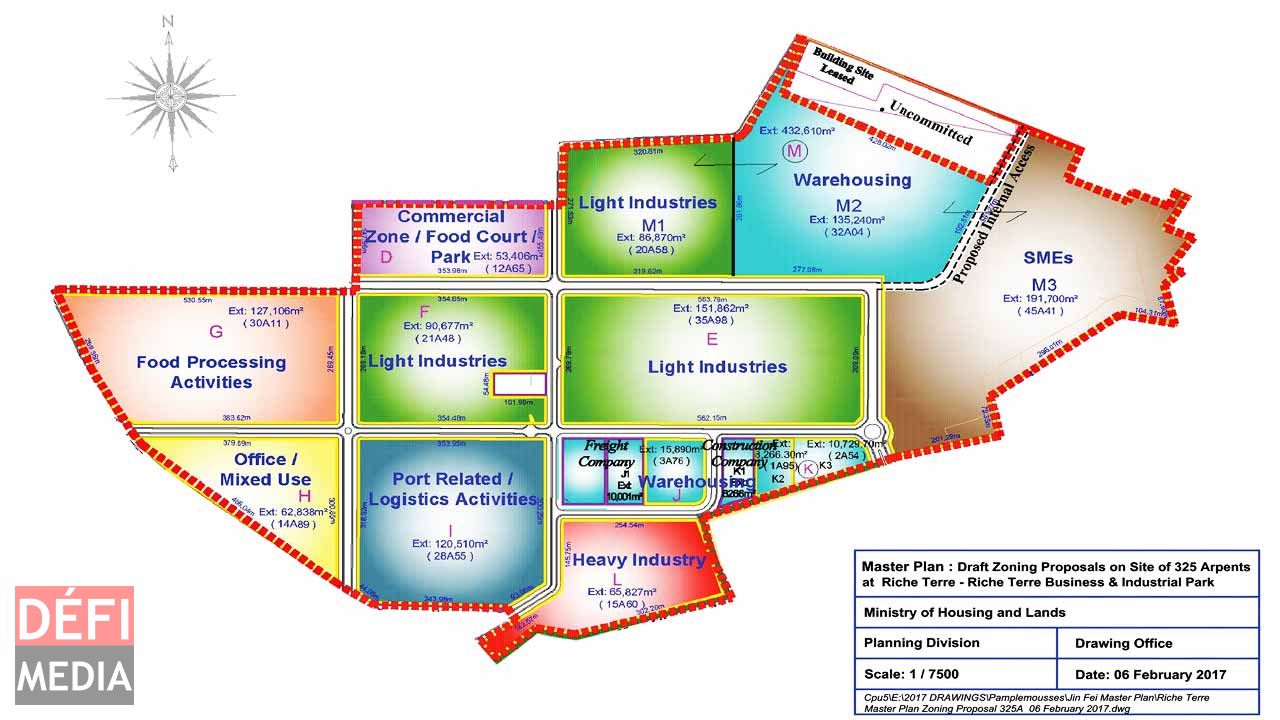
The government has decided to bring changes to the Jin Fei Economic Zone project at Riche Terre. A new Master Plan has been prepared for the 325 arpents of state land which is in waiting mode since 2008. Will the economic zone now become kicking and alive?
Publicité
The Jin Fei Economic Zone at Riche Terre has known a new twist last week. The Ministry of Housing and Lands, in consultation with the Board of Investment and Landscope Mauritius Ltd, has prepared a Master Plan for the development of the 325 arpents of State land at Riche Terre (ex Jinfei Site). A zoning system with specific uses will be assigned to each development block. The activities will include port related/logistics activities, light and heavy industries, warehousing, food processing and small and medium enterprises. Provision has also been made for a food court, and an open leisure park. Furthermore, a road network project is under way to ease the flow of traffic to and from Riche Terre.

The saga started back in 2006 with the Chinese ‘Going Global’ strategy. In March 2007, the Mauritius Tianli Economic and Trade Cooperation Zone Co. Ltd was incorporated after the Chinese government announced that economic and trade cooperation zones should be established in six African countries including Mauritius. About 500 acres of agricultural land was granted to the Chinese company and the Mauritian government undertook huge infrastructural works. The then Finance Minister, Rama Sithanen, spoke of unprecedented development in Mauritius that would see the creation of ‘34,000 direct and 8,000 indirect jobs and investment to the tune of Rs 20 billion’. Tianli Economic Zone was hailed as a cornerstone in our economic development, with every department, every institution of the island fully engaged towards the realisation of this dream project.
But by 2009, Tianli backed out and was replaced by the Mauritius Jin Fei Economic Trade and Cooperation Zone Co Ltd. In the 2010 Budget, the then Finance Minister stated: “Two months ago the Jin Fei project was inaugurated. It is the single largest FDI in our history, for an investment of Rs 25 billion over eight years, creating some 40,000 jobs, both direct and indirect.” Still, the project did not kick off as promised. In the meantime, the Wastewater Management Authority invested in a sewage network for Rs 97 million, while the Central Water Authority invested Rs 94.8 m in 2010. The Central Electricity Board, on its side, had to invest
Rs 225 m in transmission and distribution works, including construction of a 66 KV sub-station. In addition, the estimated costs of increasing the capacity of La Nicolière Treatment Plant from 66,000 m3 to 100,000 m3 per day were estimated at Rs 480 m. It was also feared that the delay in the zone becoming operational would entail further costs as unutilised infrastructure and equipment would lead to their deterioration.
In 2012, the government set up a committee to identify solutions and facilitate the progress of the project. In 2013, another Chinese group, the Cin Gin, showed an interest in the zone and proposed to invest Rs 13.5 billion in a mixed use development consisting of office blocks, residential units, villas, hotels, leisure parks and other attractions. The project is still in abeyance.

In 2014, the then Prime Minister announced at the annual dinner of the Mauritius Chamber of Commerce and Industry (MCCI) that the economic zone at Jin Fei would also house small and medium enterprises. The MCCI welcomed the measure as a boon for exporters. But nothing really happened.
Last week, the Cabinet announced the review of the masterplan to include port related/logistics activities, light and heavy industries, warehousing, food processing and small and medium enterprises, among other amenities. The project is likely to be spearheaded by the Board of Investment and Landscope Mauritius Ltd, under the supervision of the ministry of Housing and Lands. Will 2017 be the light at the end of the Tianli-Jin Fei-Cin Jin tunnel? Time will tell!
Tianli and Jin Fei
The Mauritius Tianli Economic and Trade Cooperation Zone Co. Ltd, incorporated on 19 March 2007, has already been removed from the Registrar of Companies. The company had only one shareholder, Shanxi Tianli Enterprise Co Ltd, a Chinese company. The Mauritius Jin Fei Economic Trade and Cooperation Zone Co Ltd was incorporated on 13 August 2009, with its sole shareholder being Shanxi Jinfei Investment Co Ltd.
 Arvind Nilmadhub: An opportunity for SMEs in the services sector
Arvind Nilmadhub: An opportunity for SMEs in the services sector
Arvind Nilmadhub, economist, says the future is in the booming services sector and more and more small and medium enterprises must enter this sector so far dominated by large organisations. “The decision to house SMEs at Jin Fei zone is laudable, however, will the government lease its own land from Jin Fei or is it taking back the land? The redesigning of the masterplan is a welcoming move, but such projects will take time. We must realise that, after the BAI crash and the current political instability, foreign investors, and even local ones, are a bit skeptical. The government is indeed trying to capitalize on the feel good factor following the appointment of a new Prime Minister, and the release of the positive Business Confidence Index of the Mauritius Chamber of Commerce and Industry, but we must also face the reality. Let me explain: The aftermath of the BAI has not met closure and the political situation is also having an impact on investment. Local entrepreneurs are impatiently waiting for announced projects to kick off. Now, if we analyse the MCCI Business Confidence Index, we note that confidence has risen, but we have to bear in mind that members of the MCCI, who were surveyed, are not necessarily SMEs. SMEs are considered as engines of growth and should therefore be encouraged to become more active in the services sector. The change in use of the Jin Fei zone will herald a new dawn for SMEs if the project materialises.”
 Anecdotes
Anecdotes
Mediation
At that time, the Board of Investment was closely associated with the economic zone development at Riche Terre. The Chinese officials working on the site once faced trouble with nearby residents when the boundary wall of the site was under construction. They complained of vandalism on the site. Sometimes, the situation was such that police had to be called. One public officer working on the file was assigned the task to investigate the issue. He visited the site in the presence of the police and met the neighbours of the project to find out about their apprehension. He found out that they were unhappy that the boundary wall was too close to their residences, depriving them of space, especially to house their goats. They asked if the developers would be willing to leave a buffer zone. In return, they promised to cooperate and even help in the works. An intense mediation exercise followed and the Chinese side agreed to be more flexible and the problem was solved instantly.
Goat chasers
Jin Fei officials often complained of stray goats on their leased lands. They were so exasperated that they called for a meeting to discuss the issue. High ranking officials attended to find a solution. Thus, some officials found themselves chasing goats in the zone.

Notre service WhatsApp. Vous êtes témoins d`un événement d`actualité ou d`une scène insolite? Envoyez-nous vos photos ou vidéos sur le 5 259 82 00 !
















![[Info Soirée] : «Depi li ansint zanfan la pass mizer»](https://defimedia.info/sites/default/files/styles/square_thumbnail/public/thumbnail_180424.jpg?itok=ZOhEXf-J)





![[Explik Ou Ka thématique Part 2] : Services offerts par le CEB](https://defimedia.info/sites/default/files/styles/square_thumbnail/public/thierry_ramasawmy_0.jpg?itok=GE4zjsfL)